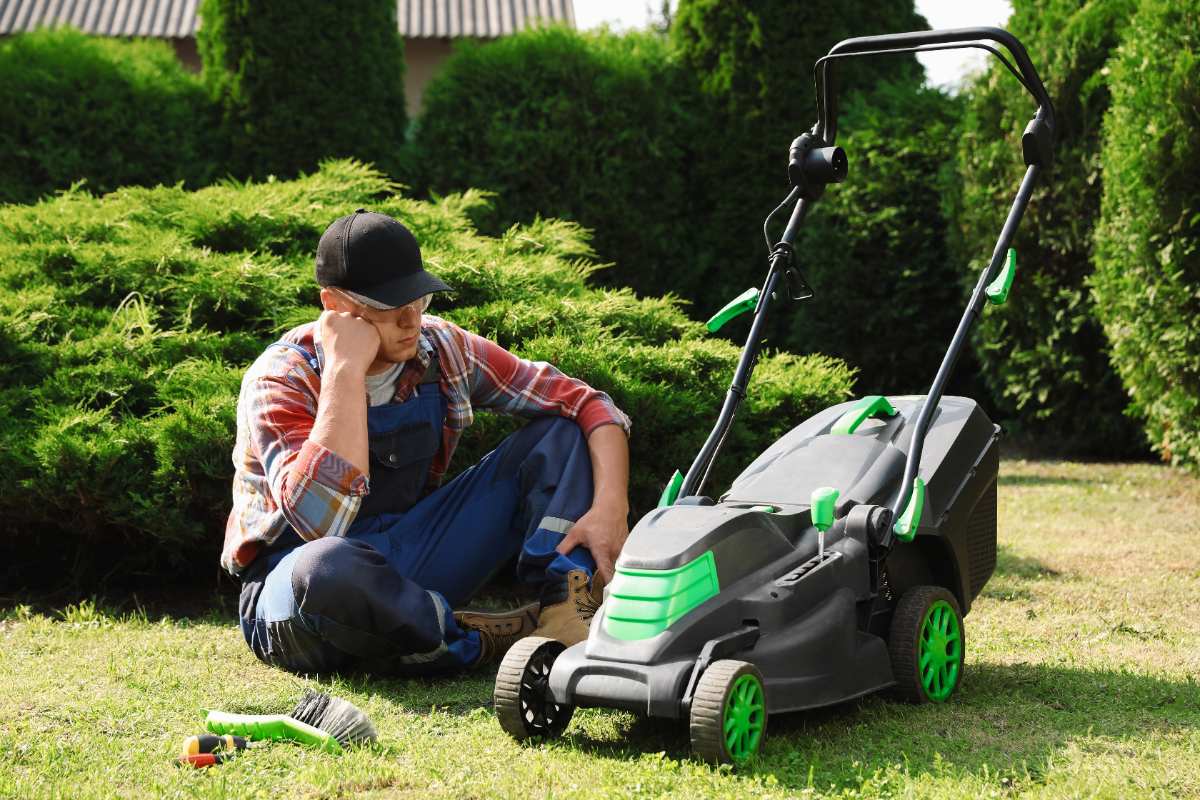
Sometimes your lawn mower needs a quick repair job, but there comes a time when fixing it may not be a practical option, if it’s an option at all.
Whether you are dealing with a smoking lawn mower, unusual noises, or poor cutting performance, learn from a specialist how to recognize the signs that it’s time to replace your lawn mower.
1. Difficulty Starting
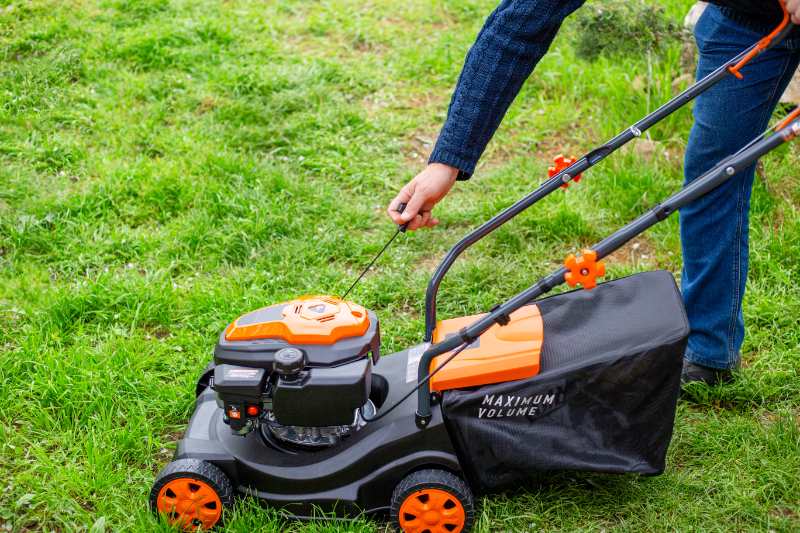
When a lawn mower has difficulty starting, it can be a sign that its engine has reached the end of its life.
Of course, other issues can also cause a mower to have difficulty starting:
- Clogged fuel line
- Dirty or worn spark plug
- Mower batteries have degraded (electric lawn mowers)
These issues can be fixed with lawn mower maintenance and repair work, so properly diagnose the issue (or take it to a local small engine repair shop) before you decide to replace your current mower.
| Instead of mowing your lawn yourself, you can hire a LawnStarter pro to trim your grass for you. Our customers pay an average of $48 per mowing service. |
See Related:
2. Excessive Smoke
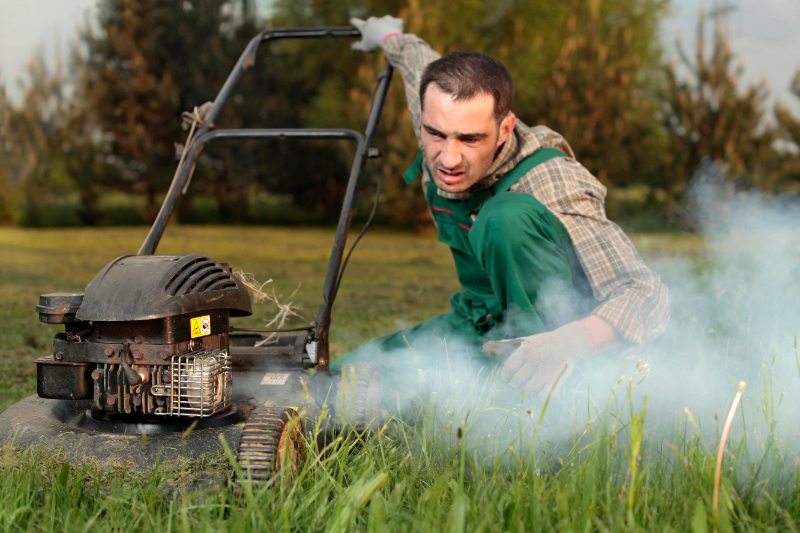
Sometimes, repairs are sufficient for fixing a smoking lawn mower. But if a lawn mower continues to smoke even after repairs, it has reached the end of its lifespan.
If your lawn mower is spouting clouds of smoke, here’s when it’s a costly problem and your mower might need replacing:
- Damaged engine or crankcase: Excessive white or blue smoke coming from your mower’s exhaust indicates an engine problem, such as a cracked crankcase.
- Electric lawn mowers: An electric lawn mower might smoke when its motor burns out. This may be fixable (e.g., clogged debris) or not (engine failure).
But there are times when excessive smoke is not a big issue, such as:
- Burning oil: When the oil tank is filled too high, burning oil might cause white smoke. To resolve this issue, allow the lawn mower to cool down and then remove the excess oil. Be careful not to overfill your tank again.
- Clogged air filter: Black smoke coming from your lawn mower may be caused by a clogged air filter. To fix this issue, clean or replace your mower’s air filter.
See Related: 8 Best Lawn Mowers
3. Oil Leaks
Keep track of how much oil it typically takes to refill your lawn mower. If your lawn mower starts needing more oil than normal, it might need to be replaced.
See Related: How to Change the Oil in a Lawn Mower in 9 Steps
4. Poor Cutting Performance
If you have recently sharpened your mower blades yet your lawn mower still scalps your lawn or leaves behind choppy, uneven rows of uncut grass, it might be an indicator of minor to severe damage to your lawn mower, such as:
- A loose belt
- Problems with the motor
- Mowing deck that’s rusted out, damaged, or misaligned
For a riding lawn mower, poor cutting performance might mean you have a flat tire or that its mowing deck is uneven or suffering from another problem. Before you decide to replace your lawn mower, make sure to do some troubleshooting first.
See Related: How Often Should You Sharpen Lawn Mower Blades?
5. Unusual Noises
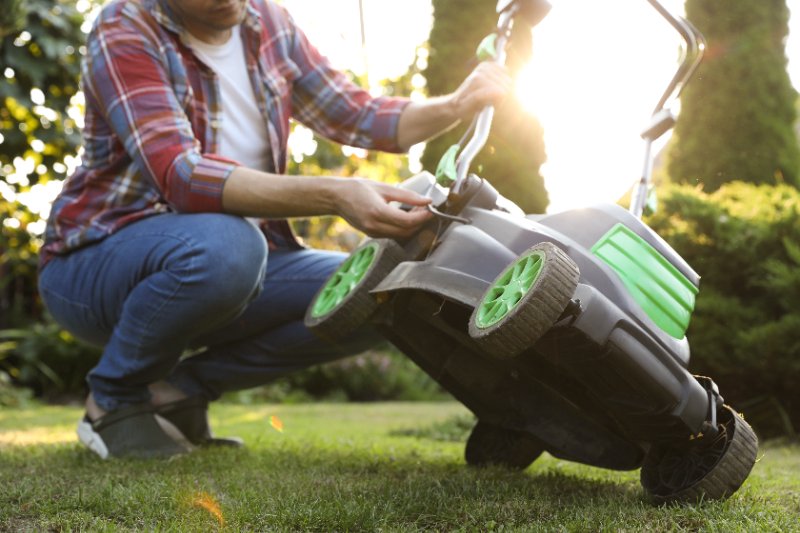
If your lawn mower continues to make unusual knocking or grinding noises, it could be a sign of internal mechanical issues, including:
- A thrown rod: This can happen if you run your lawn mower when it doesn’t have enough oil.
- A bent crankshaft: This can occur when you mow over large rocks, sticks, or stumps.
6. Excessive Vibration
When a lawn mower engine vibrates more than normal, a bent crankshaft or rod might be the culprit. You may be able to get your crankshaft repaired, but it might be easier (and cheaper) to replace your lawn mower instead.
7. Frequent Costly Repairs
Repeatedly making repairs or buying new parts for your lawn mower is probably not worth the cost. Here are some tips to avoid overspending on costly lawn mower repairs:
- Keep a record of the repairs you do and how much you spend. If you spend so much on repairs that it would be comparable to buying a new lawn mower, opt for a replacement instead.
- Do a cost-benefit analysis. Components such as the engine or the transmission are pricey to repair and may not be worth the cost. “When the cost is over $100, it might be time to get a new mower,” says Robert R. Westerfield, Extension agent at the University of Georgia.
- Consider the age of your lawn mower. Models over 10 years old will eventually give out.
- See if parts are available for your model. “Sometimes it’s difficult to find repair parts,” Westerfield says. If you can’t find the right parts for your lawn mower, it may be necessary to replace it.
“If you’re handy and can fix things, you can fix your lawn mower pretty cheaply,” says Westerfield. He suggests DIYers search on YouTube for how-to videos. However, if you do not have immediate knowledge or DIY skills, it might be easier to replace your mower.
8. Rust and Structural Damage
Rain, snow, or wet grass stuck to the mowing deck can cause rust. Rust causes significant structural damage to metal components and weakens your mower’s machinery, sometimes beyond repair. When components of a lawn mower are visibly damaged or cracked, it may not function properly.
See Related: Best Ways to Clean a Lawn Mower Deck
9. Overuse or Poor Maintenance
Nothing lasts forever, so if your lawn mower is older than 10 years, performance issues indicate that the mower should be replaced. Westerfield explains that some lawn mowers may not even last 10 years, depending on how well they are maintained and how well they are built.
“Keep them serviced,” he says, explaining that proper maintenance is the best way to extend a lawn mower’s lifespan.
If your mower has served a long time and is starting to have troubleshooting issues, it might be telling you that it’s ready to retire.
Pro Tip: Westerfield explains that a common maintenance mistake homeowners make is to store their mowing equipment improperly. To avoid this, Westerfield advises homeowners to use up all the fuel in the lawn mower and remove the spark plugs before putting it in long-term storage at the end of the mowing season.
See Related: How to Winterize Your Lawn Mower
10. Outdated Technology
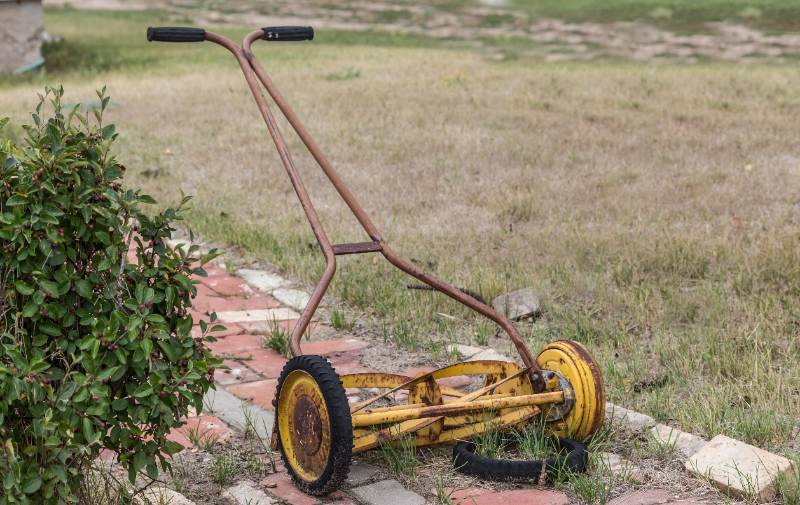
Although your lawn mower may be in perfect working order, that doesn’t make it efficient at cutting grass. Technology advances fast, so if you own an older model, you might want to upgrade your lawn mower if:
- Your push lawn mower requires a lot of physical exertion, and you’d prefer a self-propelled lawn mower instead.
- You want to replace your gas mower with an electric lawn mower.
- You’re looking for a mower with specific features, such as improved safety features.
- Your lawn mower model is underperforming compared to newer models.
When you’re ready for an upgrade, a new, updated lawn mower will be more efficient for trimming grass, and its new features will give you a better mowing experience.
11. Upgrade for a Larger Yard
A bigger yard needs a bigger mower. Westerfield explains that homeowners who own yards over 1/2 acre will need to upgrade their lawn mower, since working with a small push mower will not be feasible for trimming grass on a large plot of land.
FAQ About Replacing Your Lawn Mower
Lawn mowers have a lifespan of 10 to 15 years, so if your old lawn mower is already a decade old, it’s better to replace it rather than spend money on costly repairs.
Check local city sites for information on how to dispose of an old lawn mower. Here are some ideas:
To dispose of your mower:
• Call your city trash collection for a curbside pickup.
• Ask your local small engine repair shop if they take them.
• See if your local metal recycling yard takes them for scrap metal.
If your lawn mower still works:
• Sell your old model.
• Donate it to charity.
• Give it to a friend or neighbor.
• List it as “free” on a social media marketplace.
Pro Tip: For disposal, drain your lawn mower of gas and oil. For electric mowers, remove the battery.
See Related: Gas vs. Electric Lawn Mowers
Prices vary depending on the model, but on average, a walk-behind lawn mower costs about $322. Riding lawn mowers cost about $2,960.
Get Professional Lawn Care
Instead of spending your money on maintaining and replacing expensive mowing equipment, consider hiring a LawnStarter pro to handle the mowing (and mower upkeep). Avoid the hassle of lawn care and leave your yard in the hands of a qualified, licensed lawn care pro.
Sources:
Bob Westerfield, Extension agent at the University of Georgia, Griffin, GA. Personal interview.
Main Image Credit: New Africa / Adobe Stock